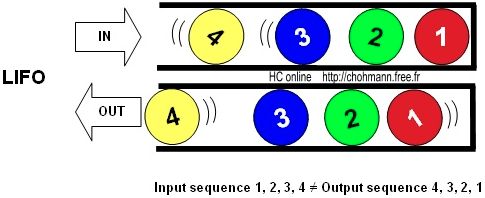LIFO (last in first out) queues, act in the opposite fashion to that of normal FIFO queues. To extend our supermarket analogy further, in using a LIFO queueing mechanism, we, essentially, serve the last person to join the queue before the existing members of the queue are served. As you can imagine, if this were a real-life supermarket, there would probably be a number of complaints put in by people who were spending hours sitting in the same queue.
In LIFO queues, there is the distinct possibility that a couple of the first people to join the queue could remain in that position indefinitely as more and more people join the queue before they can be served. While this may not make sense as a queueing mechanism in the real world, LIFO has its advantages when it comes to programming.
LIFO queues come in particularly handy when it comes to implementing artificial-intelligence-based algorithms such as depth-first search, depth-limited search, and so on. It also comes in very handy when you want to reverse the order of something--simply populate your LIFO queue with every element, and then pop them off again once you are done. The results of this are more clearly defined in the following illustration:


